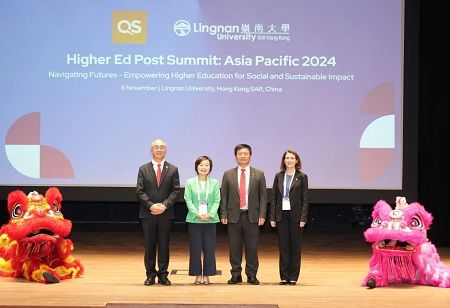-
Under the theme 'Navigating Futures – Empowering Higher Education for Social and Sustainable Impact', Lingnan University hosted the QS Higher Education Post-Summit: Asia Pacific 2024 today, November 8 on campus. The conference attracted approximately 400 of the world's leading scholars and stakeholders from universities in Hong Kong, China, Australia, and Japan to address critical challenges and transformative opportunities shaping higher education in the region.
The guest of honour, Secretary for Education, Dr Choi Yuk-lin, said in her speech: “As we stand at the crossroads of unprecedented global challenges, we are reminded of the pivotal role that higher education plays. Establishing first-class universities and nurturing first-rate talent are crucial in shaping our future”.
“With robust education infrastructure, outstanding research talents, and strong research capabilities, Hong Kong’s higher education brand has earned widesprad recognition both locally and internationally”, she said.
She pointed out that with HKSAR Government’s vision to developing Hong Kong into an international post-secondary education hub and a cradle of future talents, Hong Kong always stands ready to be a higher education strategic partner and serve as a gateway to access the potential collaboration opportunities with the Mainland.
In his welcoming address, Prof S. Joe Qin, President and Wai Kee Kau Chair Professor of Data Science at Lingnan University, expressed his heartfelt gratitude for the government’s staunch support of the event. He highlighted that the University has been actively organising international conferences as a means to forge stronger global partnerships in education. By collaborating with universities, industries, governments, and the wider society, Lingnan continues to evolve regionally into a comprehensive university of arts and sciences in the digital era, with impactful research and innovations.
President Qin said “Hosting more impactful international education conferences aligns with the government’s ambition to position Hong Kong as a global hub for higher education and to promote the ‘Study in Hong Kong’ brand to attract international students, including outstanding talents from countries involved in the Belt and Road Initiative. In line with the theme of this ‘Navigating Futures’ summit, Lingnan is entering a new stage of its spiritual journey with a clear direction in mind. Promoting a liberal arts education in the digital era highlights the uniqueness of Lingnan among UGC-funded institutions and makes us attractive to non-local students, fostering a more global learning environment that enhances our graduates' competitiveness in the international arena”.
He also explained that promoting Lingnan's liberal arts education in the digital era requires both the preservation of traditional values and continuous innovation to adapt to technological advancements and societal needs. This approach aims to meet the demands of the new era, foster the integration of the arts and sciences, and cultivate students' advanced thinking skills with digital competencies, supporting the goal of whole-person education and ensuring that the university keeps pace with the changing times.
The QS Higher Education Post-Summit: Asia Pacific 2024 included two keynote speeches, 'Social Impact of University Rankings' and 'Higher Education for Sustainability', and two panel discussions, 'Beyond the Numbers: Unpacking the Broader Implications of University Rankings' and 'Amplifying Impact: Strategies for Integrating Sustainability in Higher Education'. Speakers and panellists focused on the social implications of university rankings, examining how these metrics influence educational policies and institutional priorities, encouraging attendees to reflect on whether the pursuit of higher rankings truly aligns with the mission of universities to serve their communities.
The discussions also stressed the crucial role universities play in advancing sustainability, emphasising the imperative to integrate sustainable policies into an academic framework. Through transformative case studies, practical strategies in line with the United Nations’ Sustainable Development Goals were explored, and panels examined innovative ways to embed sustainability in higher education as well as the far-reaching implications of rankings, and how they introduce significant change within institutions.
In his closing remarks, Vice-President (Academics) and Provost of Lingnan University and Lam Man Tsan Chair Professor of Scientific Computing Prof. Raymond Chan Hon-fu appreciated the insights received from the key-note speakers on the challenges facing higher education institutions. He thanked the panellists for the wholesome discussion on the implications of the rankings within the university setting as well as the crucial role sustainability plays within academic institutions. He said that their work had brightened the issues at hand, providing strategical action for the future. He commended the engagement of the audiences and the thoughtful questions, which would help address the issues on higher education and power institutions for positive social and sustainable change.
🍪 Do you like Cookies?
We use cookies to ensure you get the best experience on our website. Read more...

